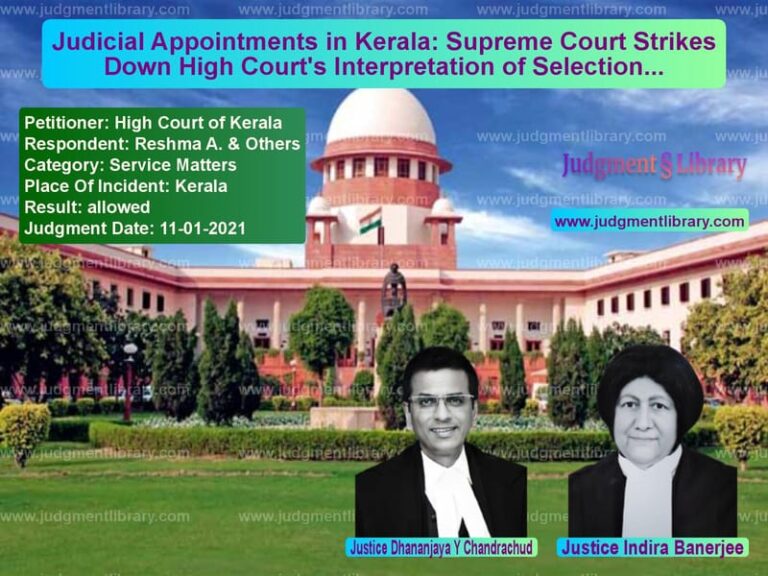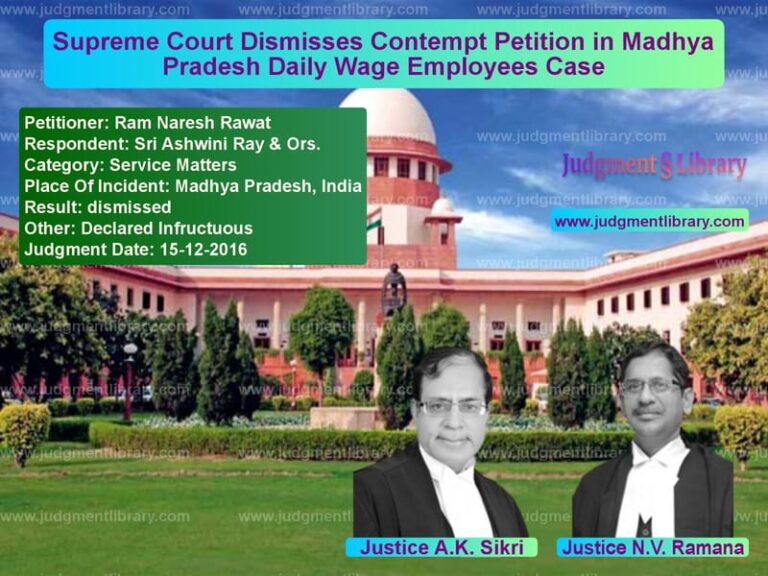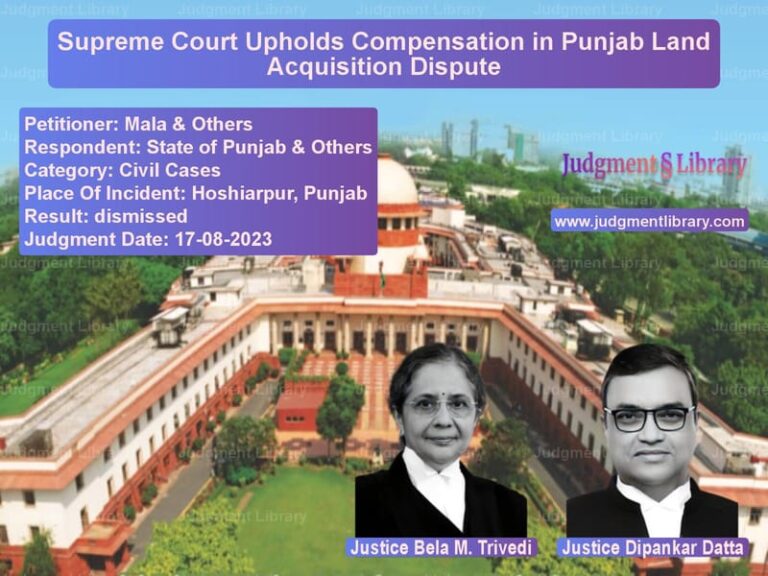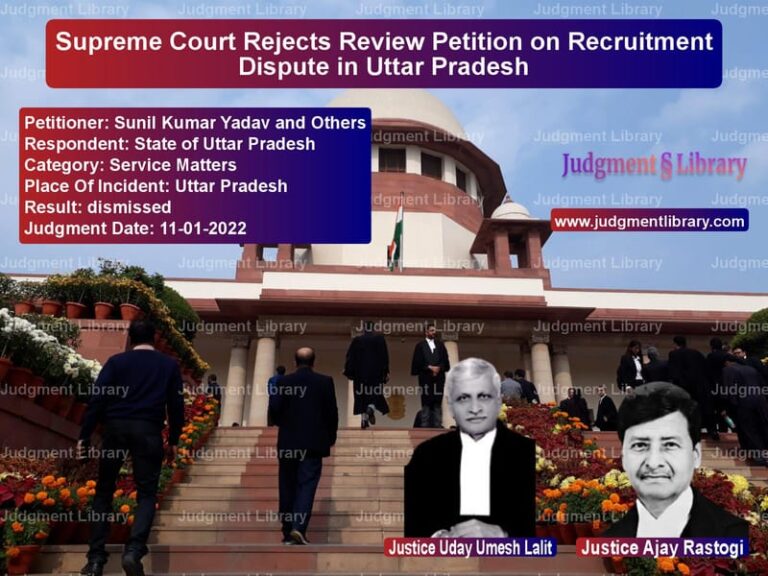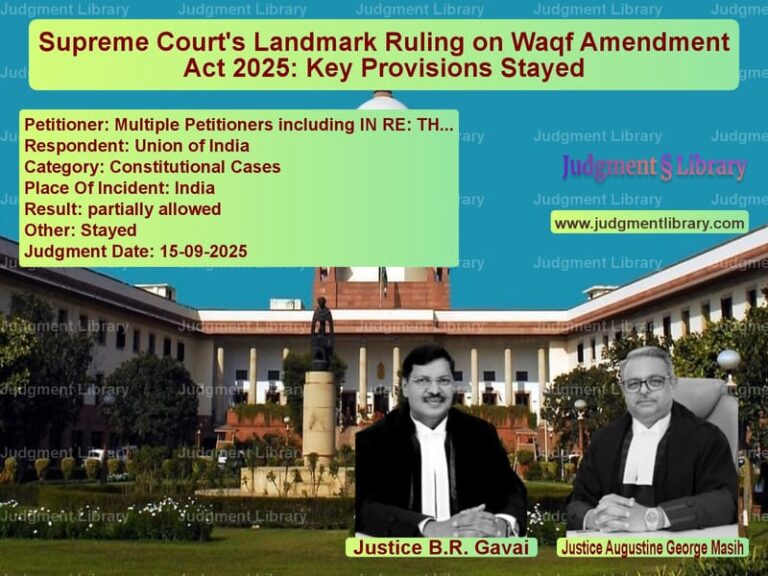Wrongful Dismissal: Supreme Court Orders Voluntary Retirement in West Bengal Electricity Board Case
The Supreme Court of India, in its judgment dated July 29, 2019, delivered a significant ruling in the case of Rathin Ghosh v. West Bengal State Electricity Distribution Company Ltd. & Ors. The case revolved around the dismissal of an employee from service on allegations of misconduct and accepting favors from a private company involved in a tender process. The appellant challenged his dismissal, arguing that the disciplinary proceedings were flawed and that the punishment imposed was disproportionate. The Court ultimately ruled in favor of the appellant, setting aside his dismissal and directing that his resignation be treated as voluntary retirement.
Background of the Case
Rathin Ghosh, the appellant, was appointed as a Graduate Engineer (Trainee) in the West Bengal State Electricity Board in 1985. Over the years, he was promoted to various positions, and in 2007, he was holding the post of Superintending Engineer. In February 2007, he was asked to draft technical specifications for single-phase static meters for procurement purposes. His draft was approved by the competent authority and used in the tendering process.
The company issued a tender (No.P-28/2007-08) for procuring ten lakh meters. During the evaluation of bids, Ghosh was part of a team that assessed the technical qualifications of the bidders. On April 16, 2008, he informed his immediate superior about attending a presentation organized by the Indian Electrical & Electronics Manufacturers’ Association (IEEMA) in New Delhi. His travel was arranged through Globe Travel Agency, which was the travel agent for one of the bidding companies, M/s. Secure Meters.
The disciplinary proceedings against him were initiated on allegations that:
- He attended a presentation in New Delhi without prior permission from his superiors.
- His travel expenses were initially covered by M/s. Secure Meters, a company involved in the tendering process.
Trial and Disciplinary Proceedings
Following an inquiry, the company accused him of misconduct and dismissed him from service. The disciplinary authority imposed the following punishments:
- Dismissal from service.
- Permanent withholding of pension for life.
- Forfeiture of his entire gratuity.
Ghosh challenged the disciplinary proceedings in the Calcutta High Court, where a single judge ruled in his favor, setting aside his dismissal and ordering his reinstatement with full back wages. However, the Division Bench overturned this decision, upholding the company’s dismissal order. Aggrieved by this, he appealed to the Supreme Court.
Arguments Presented
Arguments by the Petitioner (Rathin Ghosh):
- His attendance at the IEEMA conference was not unauthorized, as he had informed his superior officer beforehand.
- His casual leave for the travel was approved post-facto.
- He had paid for his travel expenses from his own funds, and no financial benefit was received from M/s. Secure Meters.
- The inquiry was biased, and the punishment was disproportionately severe.
Arguments by the Respondent (West Bengal State Electricity Distribution Company Ltd.):
- The charges against Ghosh were proven in the disciplinary proceedings.
- Accepting travel assistance from a company involved in the tender process was a serious violation of ethical conduct.
- The company had lost confidence in him, and reinstating him was not an option.
Supreme Court’s Observations
The Supreme Court examined whether the punishment imposed was justified and whether the disciplinary proceedings were conducted fairly. The key observations were:
- The charge of attending the IEEMA presentation without prior permission was weak, as his leave was approved post-facto.
- The inquiry report failed to prove that he had received financial benefits from M/s. Secure Meters.
- There was no evidence that he had influenced the tendering process.
- The punishment of dismissal, withholding of pension, and forfeiture of gratuity was excessive and unjustified.
The Court emphasized the principle of proportionality in disciplinary matters and held that the punishment should not be disproportionate to the gravity of the misconduct.
Key Judicial Arguments
The Court relied on previous judgments, including B.C. Chaturvedi v. Union of India, which established that the judiciary could intervene in disciplinary matters when the punishment was disproportionate to the charges proved.
In its ruling, the Supreme Court stated:
“The present is a case where the punishment is so disproportionate to the charge that it clearly shocks the conscience of the Court.”
The Court also noted that the withholding of pension and forfeiture of gratuity were beyond the jurisdiction of the disciplinary authority.
Final Verdict
The Supreme Court set aside the dismissal order and ruled that:
- Ghosh’s resignation letter, which he had submitted before the initiation of disciplinary proceedings, should be treated as voluntary retirement.
- He would be entitled to all retirement benefits, including pension and gratuity.
- The company must compute and pay all benefits within two months, failing which interest at 6% per annum would apply.
Conclusion
This judgment is a landmark ruling on employee rights and wrongful dismissal. It reinforces the principle that disciplinary actions must be proportionate and backed by concrete evidence. The Supreme Court’s intervention in this case ensures that employees are not unfairly penalized and that due process is followed in disciplinary proceedings.
Petitioner Name: Rathin Ghosh.Respondent Name: West Bengal State Electricity Distribution Company Ltd. & Ors..Judgment By: Justice Ashok Bhushan, Justice Navin Sinha.Place Of Incident: West Bengal.Judgment Date: 29-07-2019.
Don’t miss out on the full details! Download the complete judgment in PDF format below and gain valuable insights instantly!
Download Judgment: Rathin Ghosh vs West Bengal State El Supreme Court of India Judgment Dated 29-07-2019.pdf
Direct Downlaod Judgment: Direct downlaod this Judgment
See all petitions in Employment Disputes
See all petitions in Disciplinary Proceedings
See all petitions in Public Sector Employees
See all petitions in Termination Cases
See all petitions in Pension and Gratuity
See all petitions in Judgment by Ashok Bhushan
See all petitions in Judgment by Navin Sinha
See all petitions in allowed
See all petitions in Modified
See all petitions in supreme court of India judgments July 2019
See all petitions in 2019 judgments
See all posts in Service Matters Category
See all allowed petitions in Service Matters Category
See all Dismissed petitions in Service Matters Category
See all partially allowed petitions in Service Matters Category


